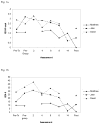Treatment of PTSD in older adults: Do cognitive-behavioral interventions remain viable?
- PMID: 22383863
- PMCID: PMC3289281
- DOI: 10.1016/j.cbpra.2010.10.002
Treatment of PTSD in older adults: Do cognitive-behavioral interventions remain viable?
Abstract
The literature examining trauma among older adults is growing, but little is known about the efficacy of empirically supported interventions for PTSD within this population. Clinical writing on this topic often implies that cognitive-behavioral treatments may be ineffective or inappropriate for older adults with PTSD given physical and/or cognitive vulnerabilities. Review of the limited research in this area, however, provides little support for the claim that cognitive-behavioral interventions are ineffective in treating PTSD among the elderly. In an effort to explicate specific issues related to treatment process and outcome among older survivors of trauma, a case series is presented outlining the treatment of three older adults within the context of a structured, cognitive-behavioral group intervention. Observations from this case series suggests that cognitive-behavioral interventions continue to be useful in treating PTSD with this population. Specific treatment issues unique to older adults are explored and recommendations for future research are discussed.
Figures
References
-
- Acierno R, Ruggiero KJ, Kilpatrick DG, Resnick HS, Galea S. Risk and protective factors for psychopathology among older versus younger adults after the 2004 Florida hurricanes. American Journal of Geriatric Psychiatry. 2006;14:1051–1059. - PubMed
-
- Aldwin CM. Does age affect the stress and coping process? Implications of age differences in perceived control. Journal of Gerontology: Psychological Sciences. 1991;46:174–180. - PubMed
-
- American Psychiatric Association. Diagnostic and Statistical Manual of Mental Disorders. 4. Washington DC: Author; 2000. text revision.
-
- American Psychiatric Association. Practice guideline for the treatment of patients with acute stress disorder and posttraumatic stress disorder. 2004 http://www.psychiatryonline.com/pracGuide/loadGuidelinePdf.aspx?file=ASD.... - PubMed
-
- American Psychological Association Working Group on the Older Adult. Guidelines for psychological practice with older adults. Professional Psychology: Research and Practice. 1998;29:413–427.
Grants and funding
LinkOut - more resources
Full Text Sources

